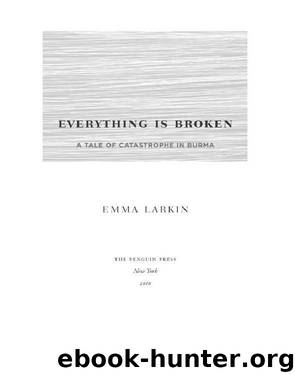Everything Is Broken by Emma Larkin

Author:Emma Larkin
Language: eng
Format: epub
Publisher: Penguin USA, Inc.
Published: 2010-03-28T16:00:00+00:00
MONKS IN MANDALAY were said to be holding out against the soldiers. Whenever soldiers approached the monasteries there, the temple bells were rung and monks would mass together to form a barricade and prevent them from entering. At one monastery, where soldiers made placatory offerings of food to the monks, the supplies had been rejected and thrown back over the monastery walls. Sacks of rice and dry noodles had piled up on the street outside the compound.
There was good reason to believe that the monks of Mandalay might be able to stave off the men with guns. The city is home to some forty thousand monks. Mandalay’s monasteries are vast complexes, with the biggest establishments, such as Ma Soe Yein, housing up to eight thousand. The city was also the site of the last major overturning of the alms bowl in 1990. Then, when monks had congregated on August 8 to remember the 1988 uprising, soldiers had attacked the crowd, wounding some monks and provoking them to instate a religious boycott against the military. During the subsequent crackdown scores of monks were arrested, and orders were issued to dissolve all independent Buddhist organizations and outline the correct behavior for monks. Since then, individual members of the regime had made frequent public displays of piety to demonstrate that they were in fact decent and respectful Buddhists. The result was an unspoken truce between the generals and the Sangha that would remain in place as long as the religious community stayed within the bounds of the new orders and did not become involved with nonreligious matters.
It is not the traditional role of monks to take on political issues, but throughout Burma’s history they have intervened on behalf of the population. When monks marched in Pakokku in September 2007, they pledged an oath in poetic form that explains their reasons. The poem, written in Pali, expresses solidarity for the laypeople from whom monks receive the support they need to survive, and it states that it is their duty to repay this kindness by cautioning those who have taken excessive actions. It ends with the following declaration:We march,
It is our obligation, and
It is our gratitude for the alms that the people have offered to us.
Download
This site does not store any files on its server. We only index and link to content provided by other sites. Please contact the content providers to delete copyright contents if any and email us, we'll remove relevant links or contents immediately.
| Arms Control | Diplomacy |
| Security | Trades & Tariffs |
| Treaties | African |
| Asian | Australian & Oceanian |
| Canadian | Caribbean & Latin American |
| European | Middle Eastern |
| Russian & Former Soviet Union |
The Secret History by Donna Tartt(19090)
The Social Justice Warrior Handbook by Lisa De Pasquale(12190)
Thirteen Reasons Why by Jay Asher(8910)
This Is How You Lose Her by Junot Diaz(6887)
Weapons of Math Destruction by Cathy O'Neil(6281)
Zero to One by Peter Thiel(5802)
Beartown by Fredrik Backman(5754)
The Myth of the Strong Leader by Archie Brown(5508)
The Fire Next Time by James Baldwin(5446)
How Democracies Die by Steven Levitsky & Daniel Ziblatt(5219)
Promise Me, Dad by Joe Biden(5153)
Stone's Rules by Roger Stone(5088)
A Higher Loyalty: Truth, Lies, and Leadership by James Comey(4964)
100 Deadly Skills by Clint Emerson(4926)
Rise and Kill First by Ronen Bergman(4789)
Secrecy World by Jake Bernstein(4753)
The David Icke Guide to the Global Conspiracy (and how to end it) by David Icke(4720)
The Farm by Tom Rob Smith(4514)
The Doomsday Machine by Daniel Ellsberg(4490)
